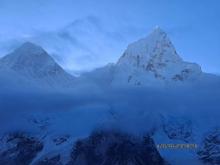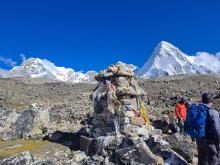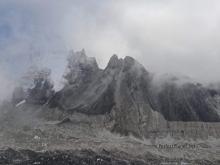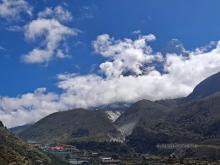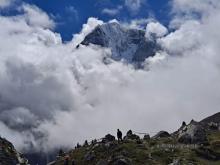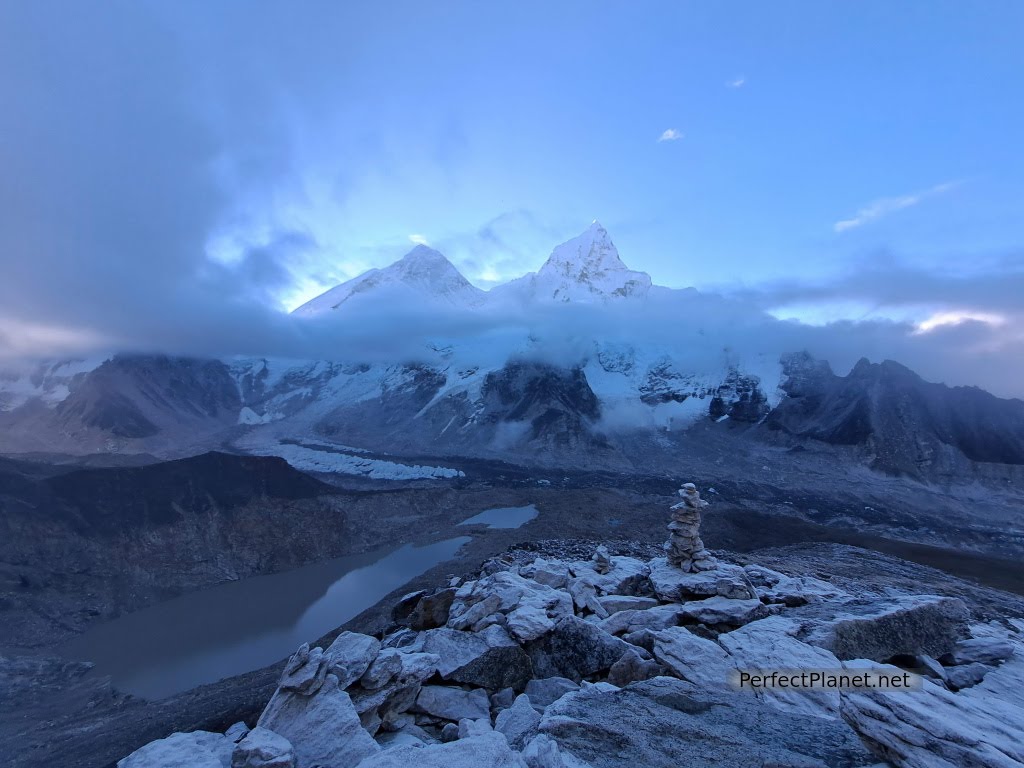
Everest y Nuptse
In our case we had included in our budget accommodation with full board, flight by light aircraft to Lukla, taxes, guide and porter for 1.035€/pax.
Maybe you will be interested in Nepal.Practical Information
and/or EBC trek preparations
Fees
If you are trekking on your own, you will have to stop at the checkpoints and pay the corresponding fees.
As soon as you start in Lukla you have to take out the Khumbu Pasang Lhamu Rural Municipality (2,000 rupees/pax). At the entrance to Sagarmatha National Park you have to pay the last fee (3,000 rupees).
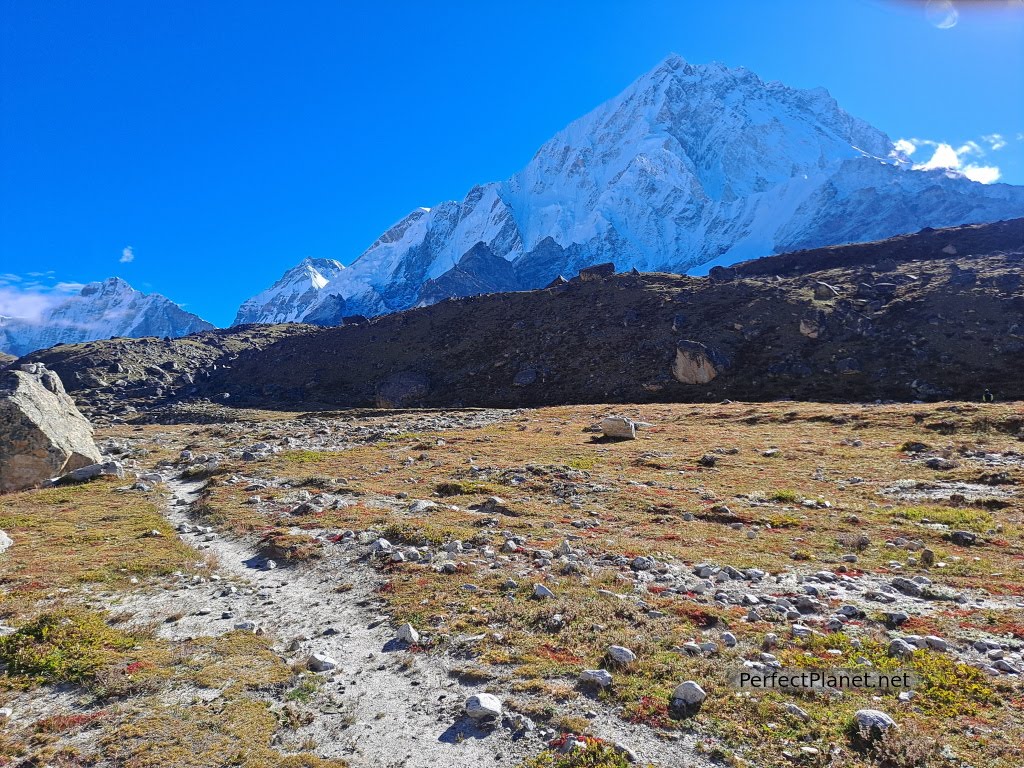
Nuptse
Accomodation
Although we had the accommodation included, we know that most of the lodges allow you to sleep for a cheap price (between 6 and 8$/night) or even free as long as you have dinner and breakfast with them, otherwise it can cost between 10 and 15$/night. Booking in advance is essential, especially in high season, when hotel capacity is low and demand outstrips supply.
Most lodges have shared bathrooms, sometimes there is only one bathroom for about 10 rooms and sometimes even outside the lodge. In each room we have found one duvet per bed, usually double rooms. There is NO heating. There is only one cooker in the dining room which is only lit at night on dried yak poo. They do not always light, in our case they only lit the cooker at 4,000 metres and above.
In the blog diary you can see the accommodations where we stayed day by day, however we indicate them for you: in Lukla Yak Hotel, in Phakdin Green Village, in Namche Everest Inn and Bodhi, in Tengboche Himalaya Inn, in Dingboche Sherpa Land Lodge, in Lobuche Himalaya Eco Resort, in Gorakshep Everest Inn, in Periche Periche Resort.
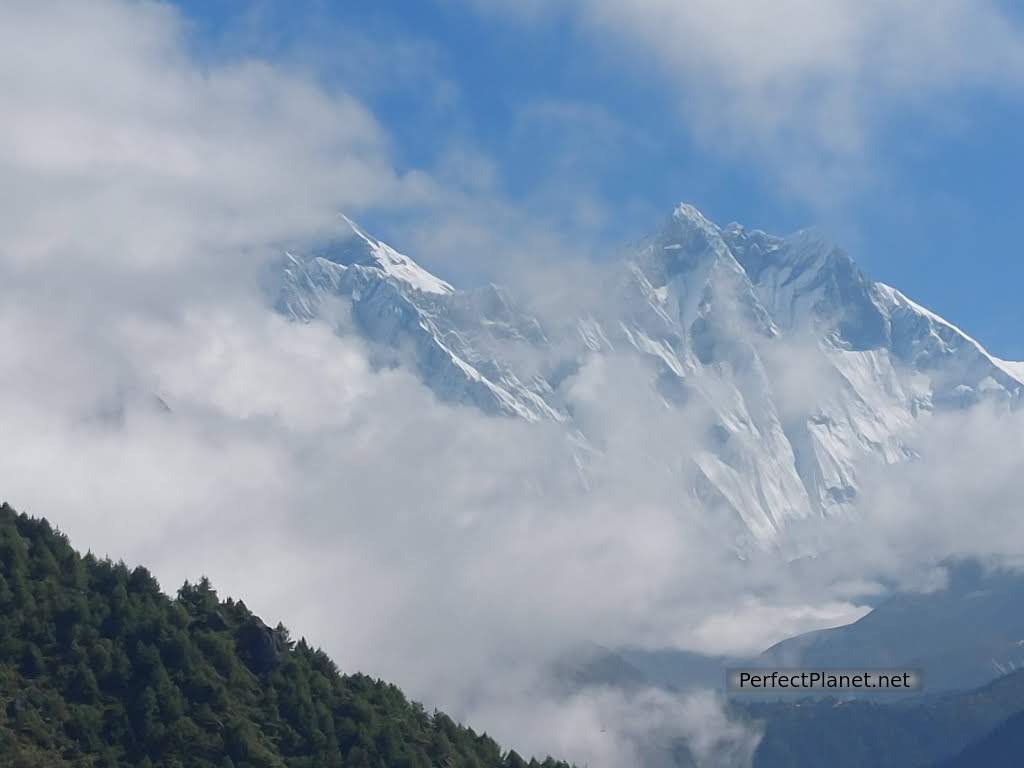
Lhotse
Food
With regard to meals, it should be pointed out that ours were included in the budget. Each meal included a drink (only tea or coffee) and a plate of food, so if you order a soup for dinner, make sure it is full enough because if you want something else you have to pay extra. Other companions with other agencies had an additional dish included with the soup at no extra cost. So if you go with an agency, negotiate it beforehand.
As with everything on this trek, as the altitude increases the price of all the services increases, so a plate of vegetarian dal bhat can cost around 450 rupees at lower altitudes and around 950 rupees at the end of the trek. The dal bhat is a very complete dish for the daily meal, it is filling and invigorating.
Based on our experience eating vegetarian on the trek is a very smart choice as most restaurants do not have refrigeration equipment and preserving meat properly is difficult, so the meat (chicken) is often highly spiced and marinated, and it is also more expensive than eating vegetarian. Sometimes you can find dried meat, we tried it because the guide gave it to us in a trusted place, in fact from 4,000 metres upwards the Nepalese do not kill animals.
In this area they grow their own potatoes, carrots, spinach and cabbage and everything is really good. If you don't tolerate spicy food, always ask for non-spicy, but even so, sometimes it stings.
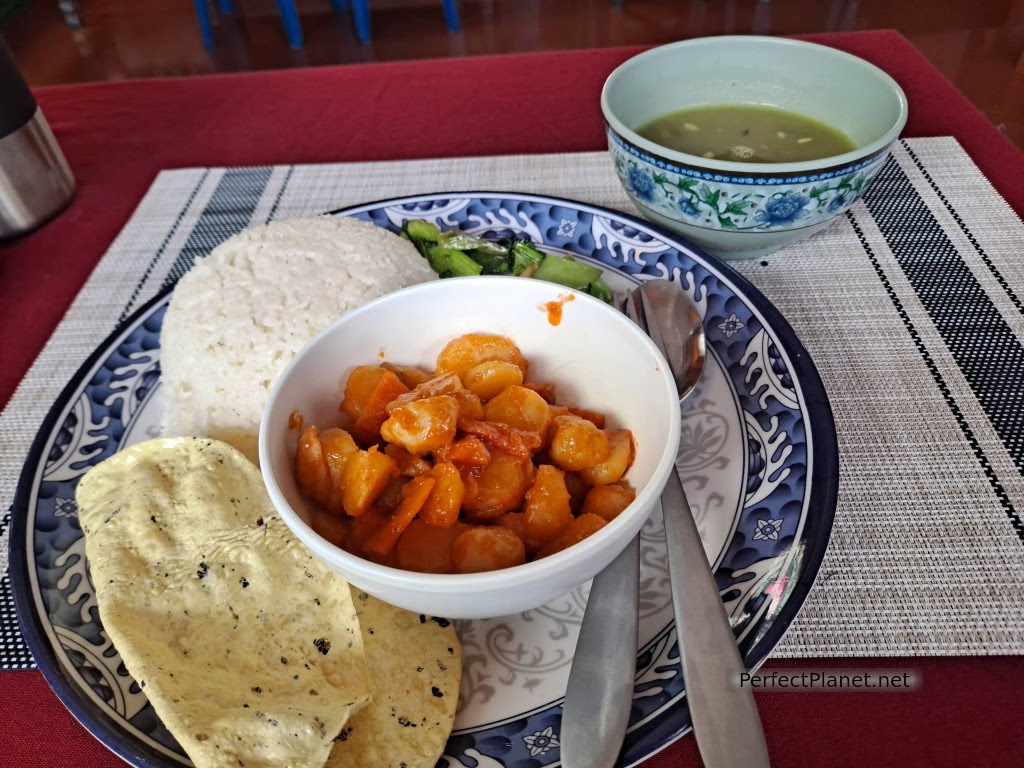
Dal Bhat
Breakfasts range from 400 rupees (eggs and toast) to 950 rupees in the higher lodges. For breakfast we recommend you try the Tibetan bread, served with honey or jam and it's delicious, it's like a churro in the shape of a cake but it's not oily.
Tips. Eating or having a drink in the lodges is much cheaper than in the other cafés and bars you'll find in some of the villages. Teas and herbal teas go from 100 rupees per cup to 350 rupees per cup. If there are several of you, it is worth asking about the price of a thermos, which is cheaper.
To give you an idea, herbal teas can cost between 100 and 200 rupees per cup (if there are several of you, you should ask for a thermos); nepali set veg or dal bhat 650 rupees, with chicken 700 rupees; noodles between 500 and 600 rupees; soups between 400 and 500 rupees; momos between 500 and 650 rupees in the first stages; at the end of the trek it can double.
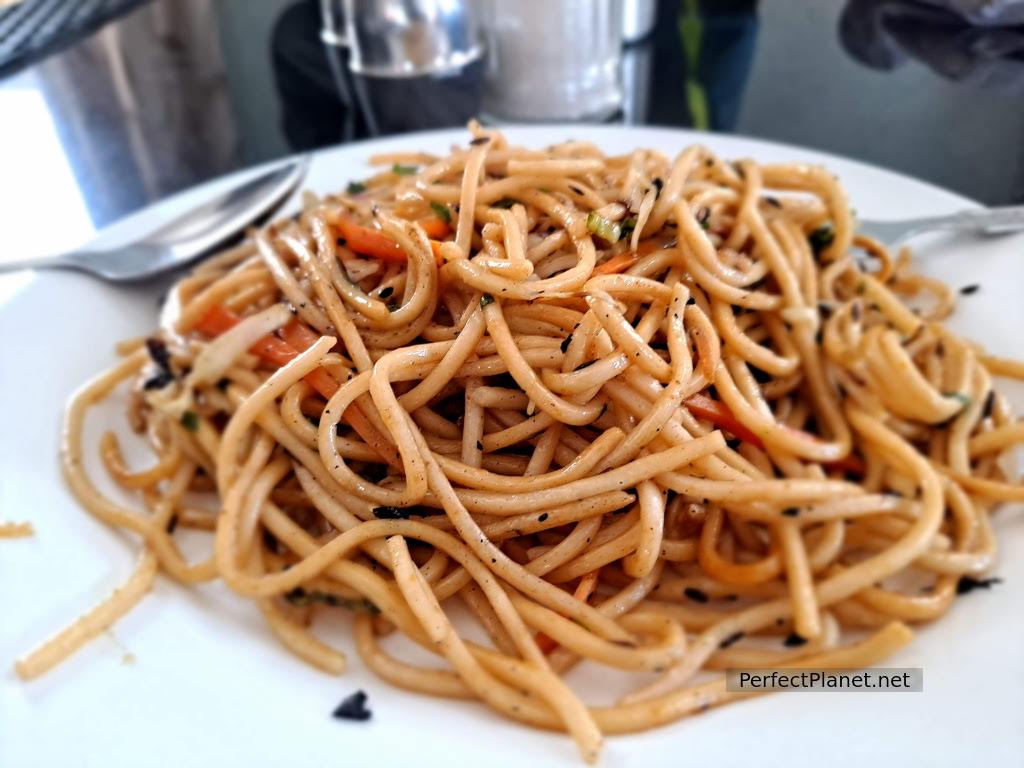
Noodles
Water
We recommend you to bring water purification tablets. It's cheaper and we don't generate so much plastic, so we take care of the environment. We buy Katadyn Micropure Forte in Spain, 100 tablets 25€, the water doesn't taste like anything, it's even better than bottled water, it only has a slight smell when you go to drink which assures you that the bottle you are drinking from is drinkable. 1 litre 1 tablet. We took 2 refillable bottles of 1 litre each, to know which one was drinkable we numbered them with a permanent marker and always followed the same order.
All the lodges provide water, so it is very easy to get it, but always remember to take a water purification tablet. Water purchased varies from 100 rupees at the beginning to 600 rupees per bottle in Gorakshep. In fact, water is not always available in Gorakshep and has to be bought.
Hygiene
Showers. Showering at altitude is overrated. This is the advice our guide gave us: don't take showers above 3,400 metres, it is not necessary. For us, who take showers every day, it is difficult to understand but following his advice we took wet wipes and cleaned ourselves in the neighbourhoods, another way of saving on the trek.
As everything depends on the altitude, the price rises, in Namche it can cost 400 or 500 rupees/pax up to 800 or 900 rupees in the last lodges, you have to take into account that the gas bottles are carried by the porters on their backs.
Laundry. Some lodges offer laundry services. They are quite expensive, between 150 and 250 rupees per item (not all items cost the same), so we recommend that you bring your own bar of soap. In many places you can ask where to wash and they will provide you with a place to hang it, but it is still a good idea to bring a long string and some tweezers.
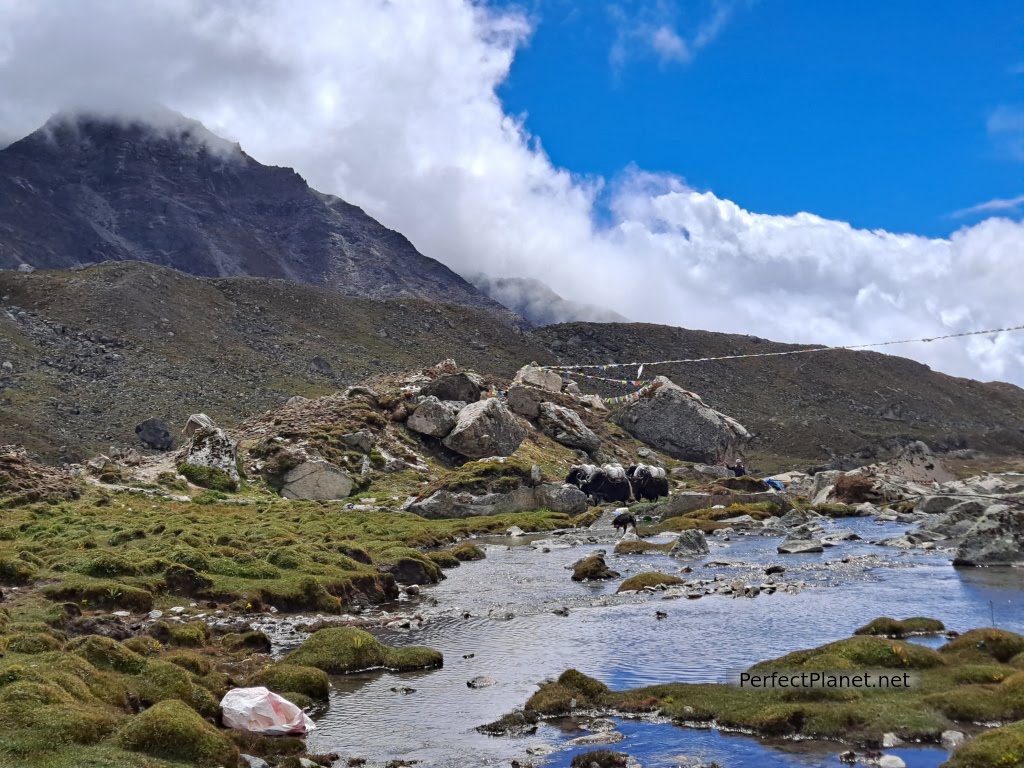
Lobuche
Wifi and recharging
The cost of wifi, like all other services, increases with altitude. Up to 4,000 metres, we were able to use the Namaste card. Above this point, even if you buy wifi, it probably won't work. At Dingboche it did work and we paid 500 rupees/day.
On arrival at Kathmandu airport we bought a 35 gigabyte Namaste 4g card for 30 days for 1,200 rupees which gave us coverage up to almost 4,000 metres.
Above 4,000 metres it is advisable to use an Everestlink card to complement the Namaste, as the prices for wifi and other services are quite expensive and sometimes do not work properly.
The same goes for batteries and mobile phones. You can start the journey paying 200 rupees per device and end up paying 800 rupees. For this reason, it is a good idea to carry a battery with several charges.
In summary, based on the prices we have indicated, a trek to the EBC on your own could cost around 760€/pax including the following items: flight 360€ round trip + permits 40€ + 11 nights 110€ + meals 250€. To this you would have to add other expenses such as battery recharges, wifi, showers if needed and other personal expenses.
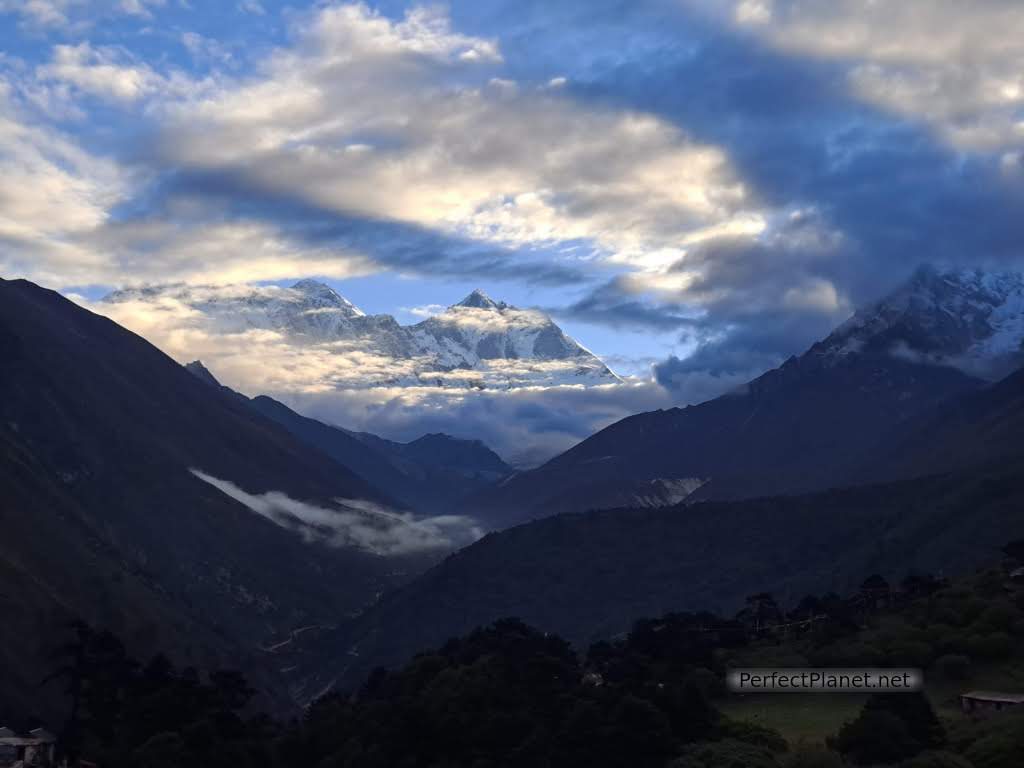
Everest and Lhotse from Tengboche
Remember to carry enough cash, as ATMs are only available in Lukla and Namche, and they don't always work.
Going on your own on the one hand is more economical, as you save the price of the guide and the porter as well as the tip which is usually around 10-15% of the total amount of the agreed budget for each one, but on the other hand you sometimes lose the essence of the local culture and those little stories that make the trek more enjoyable.
Remember to carry enough cash as there are ATMs only in Lukla and Namche and they don't always work.
We are very happy with our experience with Sonam and Chiring, without them the trip would not have been the same. You can find them at @the_monkey_travels, his name is Sonam and we can provide you with his contact details, and at Rutas Nepal.com, his name is Dipendra and we can also provide you with his direct contact details.
Dipendra was our first contact with the agency, he speaks perfect Spanish and is a very kind and detailed person.
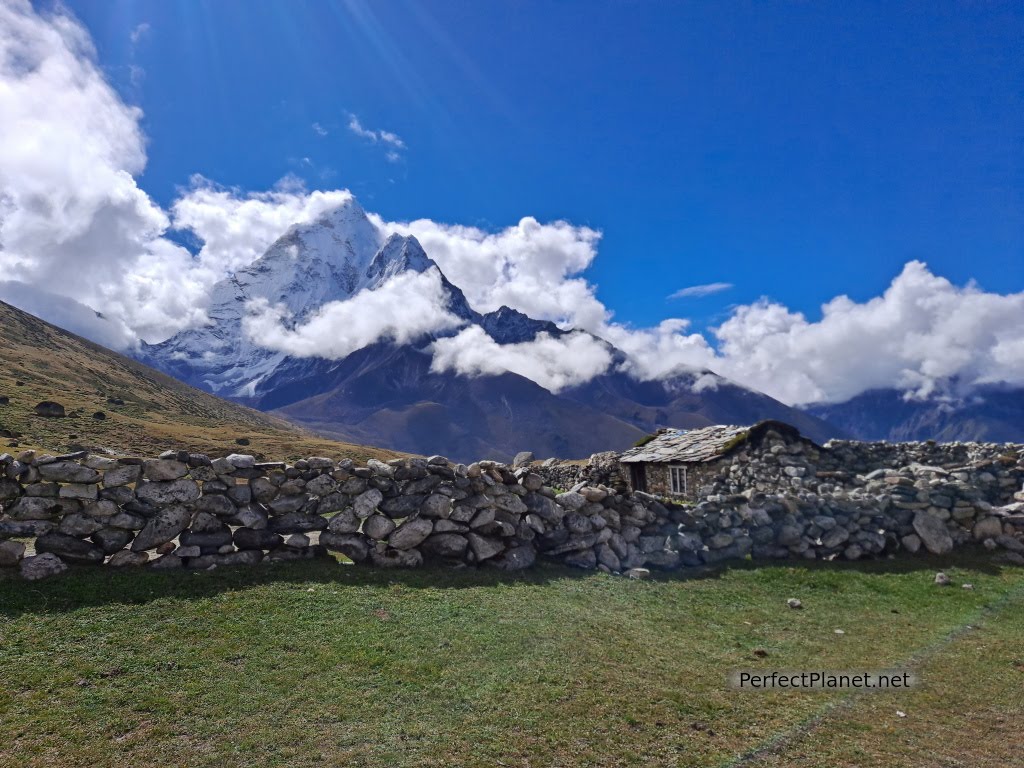
Ama Dablam
Although our guide and porter were waiting for us in Lukla, Dipendra organised everything from the moment we arrived in Kathmandu. A taxi picked us up from our accommodation to take us to and from the airport, a person from his agency visited us at our accommodation the day before to arrange payment, and this same person waited for us at the airport until he was sure we were on our flight. He also provided us with another contact person from the flight company in case we had any problems at the airport. Moreover, he called us from time to time during the trek to check that everything was OK, a professional to whom we are very grateful for all his work.
Budget with Dipendra Routes Nepal 1.035€/pax, including transfers to Kathmandu airport, light aircraft, accommodation, breakfast, lunch and daily dinners.
You may be interested in Preparations for trekking EBC
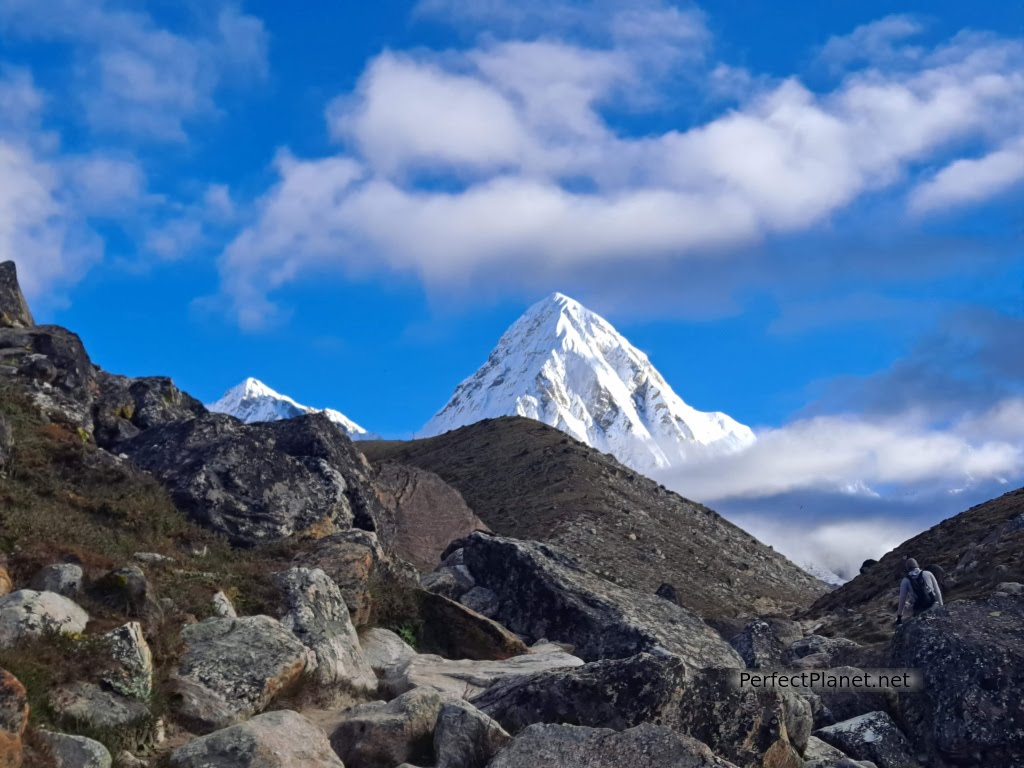
Pumori
- Log in to post comments

